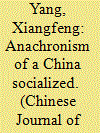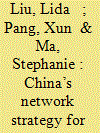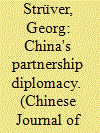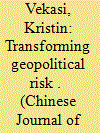|
|
|
Sort Order |
|
|
|
Items / Page
|
|
|
|
|
|
|
| Srl | Item |
| 1 |
ID:
152314


|
|
|
|
|
| Summary/Abstract |
Why has the Western strategy of engagement towards China been less effective than initially heralded? Juxtaposing theoretical advances in the International Relations (IR) scholarship against the evolution of China’s domestic politics and foreign behaviour, this article critically examines the socialization scholarship, not only because of the tremendous amount of theoretical purchase constructivists have invested in it, but also because liberal-minded IR scholars have predictably relied upon this line of inquiry to endorse a strategy of engagement and integration towards an outsider power such as China. I argue that the effects of engagement/socialization are often overstated and oversold, because conventional constructivists, in their attempt to specify the conditions under which certain behavioural adaptation constitutes identity change, tend to obfuscate some issues of theoretical and methodological concern. Two approaches are under the spotlight. First, transnationalism, as it pertains to China, has a poor record of engendering and sustaining domestic political change, because the party-state, firmly in the driver’s seat, fiercely rebuffs any foreign attempt that it deems to undermine its iron-clad hold on state power. Secondly, international institutions are not as transformative as claimed by constructivists, who conflate the distinction between agents and principals. Furthermore, the socialization perspective’s penchant for positioning the state in question in a reactive mode can be an analytical straitjacket, in turn rendering it outdated and inadequate to capture the critically important dynamics and dimensions of a great power such as China in international politics and global governance. I call for a more compressive and eclectic approach that understands China as a proactive participant in international affairs.
|
|
|
|
|
|
|
|
|
|
|
|
|
|
|
|
| 2 |
ID:
152312


|
|
|
|
|
| Summary/Abstract |
Existing scholarship on the rise of China and Chinese foreign policy has largely neglected to explain one puzzling phenomenon—although China’s network position in the global economic system has become more similar to that of developed countries, China continues to set its foreign policy from the perspective of a developing country. By analysing the relationship between the environmental possibilities and China’s intentional strategy, this article argues that the sharp contrast between China’s positions in the international political and economic systems reflects China’s ‘network strategy of embedded rise’. There are two mechanisms that go in opposite directions and jointly determine China’s foreign policy location in the international political spectrum. The first, called the ‘structural alienation effect’, is that wherein divergence in the centre-periphery positions in the global economic network increases the heterogeneity of two countries’ preferences, attitudes, and incentives, and in turn weakens alignment of their foreign policies. However, this structural effect is moderated by the second mechanism, namely, the ‘strategic affinity effect’. China’s strategy of assuming the role of a ‘broker’ to connect developing countries at the periphery of the international political and economic networks with developed countries at the centre achieves high ‘betweenness’ centrality, and so increases its social capital and influence in international politics. This article tests the proposed theory of China’s network strategy of embedded rise through hierarchical models that use global trade network centrality data and the United Nations General Assembly (UNGA) votes of 161 developing countries from 1994 to 2012. Our findings show that the globalized world both constrains and enables China’s great power status.
|
|
|
|
|
|
|
|
|
|
|
|
|
|
|
|
| 3 |
ID:
152313


|
|
|
|
|
| Summary/Abstract |
While it was impossible during much of the Cold War period to think about international cooperation absent the term ‘alliances’, over the past two decades strategic partnerships have occupied a central position in many states’ diplomatic toolkit. This article sheds light on such international alignment decisions by examining the case of China’s partnership diplomacy during the period 1990 to 2015. Theoretically, the analysis draws on scholarly insights into alliance formation and international cooperation to formulate two broad assumptions about partner choice which are based on interest-driven and ideology-based rationales of alignment. Binary regression estimations highlight the importance of economic interests in explaining partnership onset. In contrast to common arguments about alliance formation, partnerships seem unlikely to be driven by shared domestic ideologies. In fact, bilateral partnerships help to bridge ideological gaps and to enable, at least in the case of China, the respective partners’ pursuit of economic gains and diplomatic preferences. With regard to the presumed payoffs of partnerships, the analysis further suggests that partnerships mean more to bilateral relations than purely nominal titles. Rather, they have measurable impact on partners’ economic relations as well as on convergence regarding their views on the international order. China’s growing spectrum of partnerships, therefore, expands the country’s potential to exert impact on international political outcomes.
|
|
|
|
|
|
|
|
|
|
|
|
|
|
|
|
| 4 |
ID:
152315


|
|
|
|
|
| Summary/Abstract |
This article addresses the strategies of multinational firms when faced with business risk arising from nationalist tensions and interstate conflict, focusing on the use of social engagement activities under the rubric of corporate social responsibility (CSR) that are targeted at the host country’s society at large. The adoption of this strategy is contingent on firms’ risk perception: firms with higher degrees of risk perception invest more resources in social strategies. Moreover, as firms are more exposed to risk over time, they shift their risk management strategies to ones that try to transform the nature of risk through private sector activities that resemble public diplomacy. The argument is tested quantitatively using unique data on the contributions of Japanese firms to social engagement activities in China, and qualitatively with descriptive statistics from surveys of CSR activities and elite interviews with state and business actors in China and Japan. The findings highlight new sociopolitical roles for multinational firms in international politics.
|
|
|
|
|
|
|
|
|
|
|
|
|
|
|
|
|
|
|
|
|